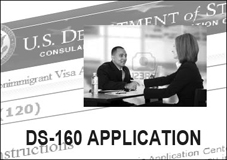|
If you're a resident of Toronto planning to travel to the United States, it's important to know about the various types of US visas that are available for you to apply. The US government offers many visa categories, which can be confusing, and choosing the right one can make or break your trip. In this comprehensive guide, I'll walk you through each of the available US visa categories for Toronto residents, including the eligibility requirements, application process, and documents required for each type.
1. B-1/B-2 Visitor Visas
B-1/B-2 visitor visas are non-immigrant visas that allow individuals to enter the US for business or tourism purposes. This category is best for those planning to attend conferences, meetings, or visit friends and family in the US. The visa is valid for up to six months, and an extension of another six months is possible. To get a B-1/B-2 visa, you'll need to provide evidence that you have no plans to stay in the US beyond the approved period.
The following documents are required for a B-1/B-2 visa application:
- A valid passport that is valid for at least six months beyond your planned stay in the US. - A completed non-immigrant visa application form (DS-160). - A receipt of visa application fee payment. - A photograph that meets the US visa requirements. - Evidence of ties to your home country, such as employment, family, or property ownership. - A letter of invitation from a US citizen or permanent resident, if applicable.
2. F-1 Student Visas
F-1 student visas are non-immigrant visas that allow individuals to attend an accredited academic institution in the US. This category is best for those who want to pursue a degree or participate in an exchange program in the US. The visa is valid for the duration of the program of study and allows for limited work on campus.
The following documents are required for an F-1 visa application:
- A valid passport that is valid for at least six months beyond your planned stay in the US. - A completed non-immigrant visa application form (DS-160). - A receipt of visa application fee payment. - A photograph that meets the US visa requirements. - An I-20 form from the academic institution you plan to attend. - Proof of financial support to cover tuition and living expenses. - Evidence of ties to your home country, such as employment, family, or property ownership.
3. J-1 Exchange Visitor Visas
J-1 exchange visitor visas are non-immigrant visas that allow individuals to participate in cultural exchange programs in the US. This category is best for those who want to participate in work and study programs, conduct research, or train in the US. The visa is valid for the duration of the exchange program and allows for limited work on campus.
The following documents are required for a J-1 visa application:
- A valid passport that is valid for at least six months beyond your planned stay in the US. - A completed non-immigrant visa application form (DS-160). - A receipt of visa application fee payment. - A photograph that meets the US visa requirements. - A DS-2019 form from the sponsoring organization that details the exchange program. - Proof of financial support to cover living expenses during the exchange program. - Evidence of ties to your home country, such as employment, family, or property ownership.
4. H-1B Specialty Occupation Visas
H-1B visas are non-immigrant visas that allow highly skilled individuals with specialized skills or education to work in the US. This category is best for those who have job offers from US employers in specialty occupations such as engineering, science, and IT. The visa is valid for up to three years and can be extended for an additional three years.
The following documents are required for an H-1B visa application:
- A valid passport that is valid for at least six months beyond your planned stay in the US. - A completed non-immigrant visa application form (DS-160). - A receipt of visa application fee payment. - A photograph that meets the US visa requirements. - Proof of your qualifications, such as a degree or certificate. - Evidence of a job offer from a US employer. - Proof of ties to your home country, such as employment, family, or property ownership.
5. Family-Based Immigration Visas
Family-based immigration visas are immigrant visas that allow US citizens and permanent residents to sponsor their family members for immigration to the US. This category includes spouses, children, parents, and siblings of US citizens and permanent residents.
The following documents are required for a family-based immigration visa application:
- A completed immigrant visa application form (DS-260). - Supporting documents that establish the family relationship, such as birth certificates, marriage certificates, or adoption papers. - A medical examination report from an approved physician. - A police clearance certificate from your home country and any other countries where you have lived for more than six months. - Evidence of financial support, such as tax returns or bank statements.
6. Employment-Based Immigration Visas
Employment-based immigration visas are immigrant visas that allow US employers to sponsor foreign workers for permanent residency in the US. This category includes individuals with extraordinary ability, advanced degrees, and other specialized skills.
The following documents are required for an employment-based immigration visa application:
- A completed immigrant visa application form (DS-260). - Supporting documents that establish your qualifications, such as degrees, certificates, or work experience. - A job offer from a US employer. - A labor certification from the US Department of Labor. - A medical examination report from an approved physician. - A police clearance certificate from your home country and any other countries where you have lived for more than six months. - Evidence of financial support, such as tax returns or bank statements.
7. Diversity Visa Program
The Diversity Visa Program, also known as the Green Card Lottery, is a program that awards a limited number of visas to individuals from countries with low rates of immigration to the US. This program is open to individuals from eligible countries who meet the educational or work experience requirements.
The following documents are required for a Diversity Visa Program application:
- A completed diversity visa program entry form. - Supporting documents that establish your eligibility, such as education or work experience certificates.
Selecting the right US visa category is critical for a successful visa application. As a resident of Toronto, it's important to understand the different visa categories available and their eligibility requirements, application processes, and required documents. To make sure you have a smooth visa application process, seek the guidance of an immigration lawyer. Although the US visa system can be overwhelming, with the right guidance, you can navigate the process successfully and enjoy your visit to the US.
|
||||||||||
Who needs a visa to US? Are you visa exempt? Fastest way to get your visa Did you make travel reservations yet? FAQ Terms and Conditions |
||||||||||



